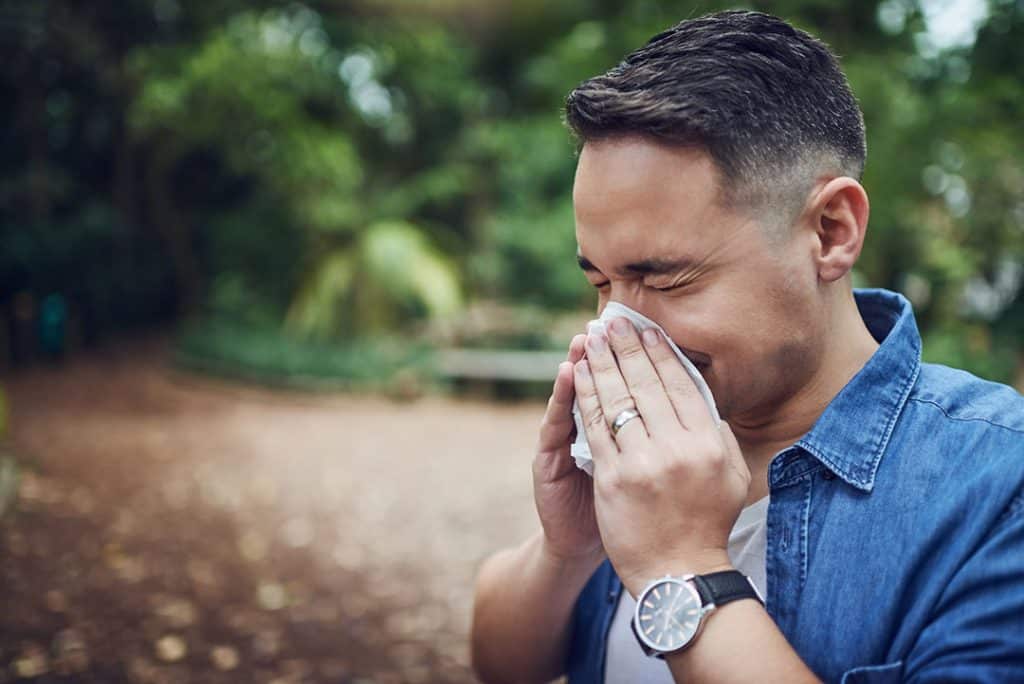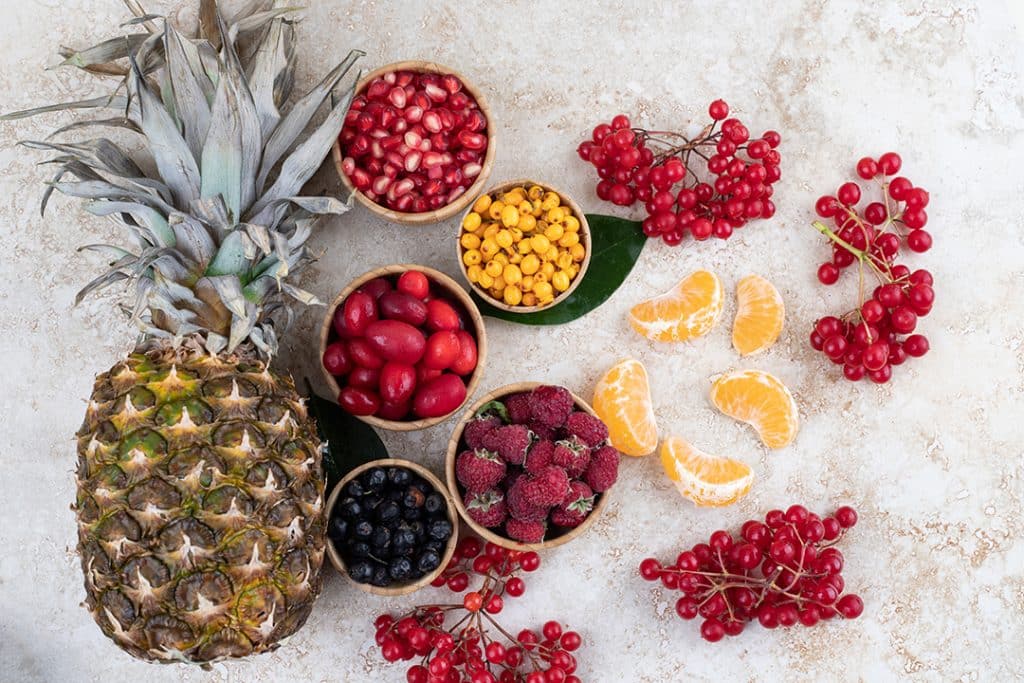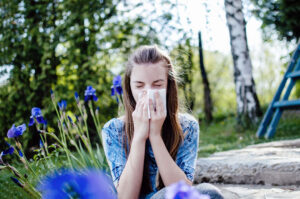Instead of over-the-counter allergy meds that lead to dry mouth and other side effects, try these natural antihistamines for allergies first.
With spring just around the corner, many of us are looking forward to spending more time in the great outdoors. That is, unless you suffer from spring allergies that drain the joy right out of long walks in the park or hikes in the woods.
The good news is that you don’t have to give up your favorite spring activities to avoid the frustration of sneezing fits, itchy eyes, and perpetually runny noses. And you don’t have to succumb to the drowsiness or side effects of prescription or over-the-counter medications, either.
What’s the secret? Mother Nature has her own pharmacy when it comes to allergy relief. Read on to learn the best natural antihistamines to alleviate your allergy symptoms this spring!
The Science Behind the Sniffles: What Are Histamines and Allergies?

If you’ve ever struggled with seasonal allergies or “hay fever,” then you’ve experienced a histamine overload.
Histamines are microscopic molecules released by the immune system. They work like messengers, alerting us the rest of the immune system that there is a potential threat or intruder. When there is an actual threat, this histamine response helps the immune system respond and fight the invader.
However, the trouble happens when histamines flare up in response to harmless substances (like pollen, pet hair or dust). Suddenly, histamines are released en masse, which causes blood vessels to dilate, tissues to swell, and nerve endings to become more sensitive. The result? Those all-too-familiar allergy symptoms like sneezing, runny noses, itchy eyes, sinus pressure, and more.
Common Seasonal Allergy Symptoms
- Sneezing
- Runny or stuffy nose
- Itchy, watery eyes
- Itchy nose, roof of mouth, or throat
- Postnasal drip
- Cough
- Dark circles under the eyes
- Fatigue
- Headaches
- Shortness of breath or wheezing
- Skin irritations (like hives or eczema)
What Works Best: Allergy Medications or Natural Remedies?

When allergies strike, many of us instinctively reach for the nearest over-the-counter (OTC) antihistamine like Claritin, Zyrtec, or Benadryl. These medications promise quick relief from common symptoms like sneezing, itching, and congestion.
While OTC medicines can shift your symptoms nearly immediately, they often come with a range of side effects such as drowsiness, dry mouth, and dizziness. Which can leave you wondering…are you just trading one set of symptoms for another?
Natural antihistamines offer a gentler approach to getting the allergy relief you need. From herbal teas to dietary supplements, these remedies harness naturally occurring ingredients to alleviate symptoms without the risk of unwanted side effects.
As a bonus, natural remedies often help improve the root cause of your allergies (such as weak immunity or inflammation) to help you prevent allergy attacks in the future.
The Best Natural Antihistamines for Allergy Relief

If a more natural approach to dealing with your allergies feels aligned with your health goals, you’ll want to save this list! Below are the top natural sources of antihistamines and immune-boosting remedies that will have you enjoying spring with a clear head and nose.
1) Quercetin
Quercetin is a plant pigment and flavonoid known for its potent antihistamine properties. It works by stabilizing mast cells, the immune cells responsible for secreting histamine in response to an allergen. By reducing the release of histamines from mast cells, you can reduce the overall allergic response and limit symptoms like sneezing, itching, and congestion.
Beyond being an antihistamine, quercetin also has powerful antioxidant properties that combat inflammation and oxidative stress. Studies show that it may support heart health and improve exercise performance.
You can boost your quercetin intake simply by loading up on foods like apples, onions, parsley, sage, tea, and berries.
2) Bromelain
Bromelain is a proteolytic enzyme found in pineapple. It is commonly known as a digestion aid, but bromelain also boasts potent natural antihistamine properties. Bromelain can help prevent the release of histamines and reduce inflammation to combat allergy symptoms like nasal congestion and itching. Bromelain also helps reduce inflammation elsewhere in the body, and is particularly helpful for recovering from muscle and tendon strains and sinus health.
Want more bromelain in your diet? Start adding pineapple to your daily diet as a snack, or add it to smoothies, salads, or savory dishes. And don’t waste the core! That’s where the highest concentration of bromelain is stored.
3) Vitamin C
When you think of an immunity vitamin, you likely think of vitamin C. But did you know it also acts as a natural antihistamine? Vitamin C helps mitigate allergic reactions by stabilizing mast cells and reducing their histamine release. This helps clear up those pesky allergy symptoms like sneezing and itching.
Beyond its role in allergy relief, vitamin C also supports a healthy immune system by helping white blood cells work better. It also enhances collagen production for healthy skin, and boosts energy by increasing iron absorption.
Ready to get more vitamin C? Citrus fruits like oranges and lemons are great sources, as are bell peppers, strawberries, and broccoli.
4) Stinging Nettle
Stinging nettles may sound like something that would cause allergies. But in reality, these leafy greens contain compounds that act as natural antihistamines. They block histamine receptors and inhibit processes that cause inflammation, which helps reduce or prevent full-blown allergy symptoms.
Stinging nettles are also rich in vitamins, minerals, and antioxidants that can support other areas of your well-being, from urinary tract health to heart health to joint health.
Stinging nettle can be found fresh, dried, or as a supplement. If you can find the fresh variety, boil them slightly before adding it to soups, smoothies, or sautéing them (this will remove the sting). The dried version makes a delicious tea when brewed in hot water.
5) Butterbur
Butterbur is a lesser known herbal remedy, but a powerful one. In fact, studies show that butterbur extract is as effective as the allergy medicine Allegra, and can help relieve sneezing, nasal congestion, itchy eyes, and runny nose. This is all thanks to its active compounds, petasin and isopetasin, which work to prevent the release of histamines and moderate the immune response.
Studies also suggest butterbur may help alleviate migraines, reduce inflammation, and support urinary tract health.
While butterbur is not typically consumed as a food, you can find it as an extract or in supplement form.
6) Probiotics
You’ve probably heard how great probiotics can be for your gut health. But did you know that probiotics can also help you improve your allergies? Research suggests that probiotics keep histamine levels down by modulating the immune response and reducing inflammation. They also strengthen your gut-immune connection and promote overall well-being.
To incorporate probiotics into your diet, be sure to include fermented foods like yogurt, kefir, sauerkraut, or kimchi on your plate each day. These delicious options not only provide a natural source of probiotics but also add flavor and variety to your meals. If enjoying fermented foods regularly is a challenge, a well-rounded probiotic supplement like Aceva’s Ultrabiotic can easily fill in the gaps!
7) Quercetin + Bromelain
As we’ve seen, quercetin and bromelain are both powerful natural antihistamines in their own rights. However, combining the two creates a natural remedy that is greater than the sum of its parts.
Using quercetin and bromelain as a duo enhances the effects of each. For instance, bromelain boosts the absorption of quercetin while also providing additional anti-inflammatory benefits.
How to Add More Natural Antihistamines to Your Diet

Incorporating natural antihistamine-rich foods into your diet doesn’t have to be complicated. Here are some practical tips and delicious recipes to help you get creative (and congestion-free) in the kitchen:
> Start your day with fruit.
Blend together pineapple (a great source of bromelain), berries (rich in quercetin), and spinach (contains vitamin C) for a refreshing smoothie or an allergy-fighting fruit salad.
> Add greens to your salads.
Leafy greens like kale – as well as brussels sprouts, cabbage, and broccoli – are high in vitamin C and add a satifying crunch to salads. If you can find them fresh, try incorporating stinging nettles or butterbur into your salads for an extra boost of natural antihistamines. Just be sure to blanch or cook the nettles first to remove their stinging hairs.
> Try a stir-fry.
Stir fries are simple ways to pack a whole host of antihistamine benefits into a delicious lunch or dinner. Sauté bell peppers, onions, and broccoli with tofu or chicken for a flavorful and allergy-friendly dinner. Add a squeeze of lime or orange for an additional boost of vitamin C.
> Snack on citrus fruits.
Keep a bowl of oranges, clementines or grapefruits handy for a quick and easy source of vitamin C throughout the day. Strawberries and blackcurrants will also help you kick your allergies to the curb – try making your own healthy jam with them!
> Make a smoothing tea.
Brew a cup of chamomile tea and add a touch of honey (which contains trace amounts of quercetin) or dried stinging nettles for a calming and allergy-relieving beverage.
When is the Best Time to Take Antihistamines?

When it comes to using natural antihistamines, timing can make a big difference in your allergy symptoms.
If you know your allergy triggers (such as pollen or pet hair) taking natural antihistamines before being exposed to can help prevent symptoms from occurring in the first place. During allergy season, it may be best to take natural antihistamines daily as a proactive approach.
What if your symptoms have already started? Start taking your chosen natural antihistamines as soon as possible to calm your immune response and your symptoms.
It’s generally recommended to take natural antihistamines in the morning. This allows the compounds to already be in effect when you are exposed to an allergen (like tree pollen) and provides continuous protection throughout the day.
Most natural antihistamines do not have a drowsy effect, like OTC medicines do. But, if you find that certain natural antihistamines cause drowsiness, you may prefer to take them in the evening or before bedtime. If you plan to take natural antihistamines along with an OTC or prescribed allergy medication, however, it may be helpful to take the natural supplements in the morning and the medication at night for all-day relief (and a good night’s sleep).
More Natural Allergy Relief Solutions

Beyond getting your natural antihistamines in your diet, there are a number of other ways to keep histamine levels low and avoid the dreaded spring allergies.
> See your chiropractor.
Chiropractic care isn’t just for pain! It can also help alleviate allergy symptoms by improving nervous system function and reducing inflammation. If you’re currently struggling with allergies or chronic rhinitis, certain adjustments and manipulations can help relieve swelling and help you breathe easier.
> Try acupuncture.
Along with chiropractic care, acupuncture can help balance your immune system and keep allergy symptoms at bay. If you’re already feeling the effects of this year’s pollen counts, acupuncture encourages healthy blood flow, reduces swelling and inflammation, and unblocks the nasal passages to help you get natural symptom relief.
> Get regular exercise.
Exercise is a great way to stay in shape during spring. But, it can also act as a natural antihistamine. Exercise naturally boosts blood circulation, which helps the body clear away allergens more effectively. Regular physical activity is also a proven key factor in a healthy immune reponse.
Any exercise you enjoy is good exercise. If you are struggling with allergy symptoms, however, consider keeping your exercise routine indoors until you’ve built up your resilience, or wear a mask when exercising outside to reduce your exposure to pollen.
> Use a neti pot.
Neti pots are a traditional Ayurvedic remedy that can help clear nasal congestion and sinus pressure. How does it work? A neti pot is a small, teapot-like device allows you to perform nasal irrigation – a process where a saline solution is poured through one nostril and flows out the other. This method helps flush out pollen, dust, and other allergens trapped in your sinuses, which helps to reduce inflammation and improve your breathing.
> Support with supplements.
Sometimes spring allergies sneak up on you, no matter how much you prepare. If that’s the case for you, a smart supplementation plan can help you fight off allergy symptoms and prevent them in the future.
Aceva’s Aller-Aid is the go-to natural supplement for combatting seasonal allergies. Aller-Aid combines the effects of quercetin, bromelain, and stinging nettle in one powerful dose to support your best immune function from the root and reduce excessive histamine in the bloodstream.
Enjoy Spring Allergy-Free

Don’t let allergies ruin another spring. With these and other natural remedies for allergies, you can get your histamine levels under control all while supporting your immune health.
Looking for a more comprehensive way to stop allergies and celebrate spring? The experts at your local AlignLife Center are here to help. Through chiropractic, functional nutrition, and other care plans, your AlignLife team will guide you to the naturally allergy-free lifestyle you deserve.
Schedule a visit at an AlignLife center near you today to get started!



